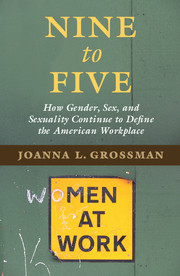Book contents
- Frontmatter
- Dedication
- Contents
- Foreword
- Acknowledgments
- Introduction
- PART I WHAT IS SEX DISCRIMINATION?
- PART II SEXUAL HARASSMENT
- 12 Workplace Affairs and Sexual Favoritism
- 13 Lolita at the Office
- 14 Sex Talk in the Writers’ Room
- 15 Sex Behind Bars
- 16 When the Supervisor Bullies Only Women
- 17 The Equal Opportunity Harasser
- 18 Periodontal Perils
- 19 Punishing Effeminacy
- 20 Late-Night Affairs with David Letterman
- 21 Why Herman Cain Has Not Been Able to Talk His Way Out of His Exploding Sexual Harassment Scandal
- 22 Why Hostile Environment Harassment Is a “Continuing Violation”
- 23 When Sexual Extortion Is Successful
- 24 The Consequences of Failing to Complain about Harassment
- 25 Who Is Responsible for Sudden, Severe Harassment?
- 26 Chinks in the Harassment Law Armor
- 27 Do Employer Efforts Prevent Harassment or Just Prevent Liability?
- 28 Who's the Boss?
- 29 Costly Mistakes
- 30 Hands Off the Merchandise
- PART III PREGNANT WOMEN AND MOTHERS AT WORK
- PART IV FEMALE BREADWINNERS AND THE GLASS CEILING
- Conclusion
- Notes
- Index
15 - Sex Behind Bars
from PART II - SEXUAL HARASSMENT
Published online by Cambridge University Press: 05 May 2016
- Frontmatter
- Dedication
- Contents
- Foreword
- Acknowledgments
- Introduction
- PART I WHAT IS SEX DISCRIMINATION?
- PART II SEXUAL HARASSMENT
- 12 Workplace Affairs and Sexual Favoritism
- 13 Lolita at the Office
- 14 Sex Talk in the Writers’ Room
- 15 Sex Behind Bars
- 16 When the Supervisor Bullies Only Women
- 17 The Equal Opportunity Harasser
- 18 Periodontal Perils
- 19 Punishing Effeminacy
- 20 Late-Night Affairs with David Letterman
- 21 Why Herman Cain Has Not Been Able to Talk His Way Out of His Exploding Sexual Harassment Scandal
- 22 Why Hostile Environment Harassment Is a “Continuing Violation”
- 23 When Sexual Extortion Is Successful
- 24 The Consequences of Failing to Complain about Harassment
- 25 Who Is Responsible for Sudden, Severe Harassment?
- 26 Chinks in the Harassment Law Armor
- 27 Do Employer Efforts Prevent Harassment or Just Prevent Liability?
- 28 Who's the Boss?
- 29 Costly Mistakes
- 30 Hands Off the Merchandise
- PART III PREGNANT WOMEN AND MOTHERS AT WORK
- PART IV FEMALE BREADWINNERS AND THE GLASS CEILING
- Conclusion
- Notes
- Index
Summary
One might watch the Netflix original series Orange Is the New Black and think that the rampant sexual encounters in the prison – involving the warden, correctional officers, and inmates in various pairings – are trumped up to appeal to the prurient interests of viewers. But there is no shortage of real cases involving similar behavior, raising complicated questions about harassment or other forms of discrimination.
As discussed in Chapter 12, the case of Miller v. Department of Correction showcased the problem of sexual favoritism, arising from a deputy warden carrying on affairs with several subordinate female employees and granting undeserved privileges and promotions to his paramours. Only because his sexual favoritism pervaded the workplace in such a shocking way was it actionable.
In a ruling from the Seventh Circuit Court of Appeals, Orton-Bell v. Indiana, the court had to address different questions arising out of sex between prison employees. Among the questions raised is whether using someone's desk for sexual liaisons creates a hostile environment for the office holder and whether differential treatment of two employees disciplined for a forbidden sexual liaison is discrimination. The court's job in this case was to sort through the facts to determine which might give rise to an actionable claim of discrimination and which were merely disgusting.
WORKPLACE LIFE AT AN INDIANA PRISON
Connie Orton-Bell worked as a substance abuse counselor at a maximum-security prison in Indiana. She had complained at some point about the possibility that someone was using her office computer at night, which raised concerns about a security breach. An investigator looked into her complaint, discovering that her office was being used at night without her knowledge. But it wasn't being invaded by inmates or hackers – it was being used by night-shift employees for sexual liaisons. Specifically, they were having sex on her desk. (This explained why, in the past, she had noticed strange stains on her desk in the morning.) The investigator was apparently relieved by the absence of a security breach and not at all concerned about the sex-on-the-desk problem. Orton-Bell asked the investigator what she should do about the problem, and he replied: “I suggest you wash off your desk every day.” When she protested, he insisted that “staff having sex is no concern to us” as long as it does not involve sex between “staff and offender.”
- Type
- Chapter
- Information
- Nine to FiveHow Gender, Sex, and Sexuality Continue to Define the American Workplace, pp. 96 - 100Publisher: Cambridge University PressPrint publication year: 2016



